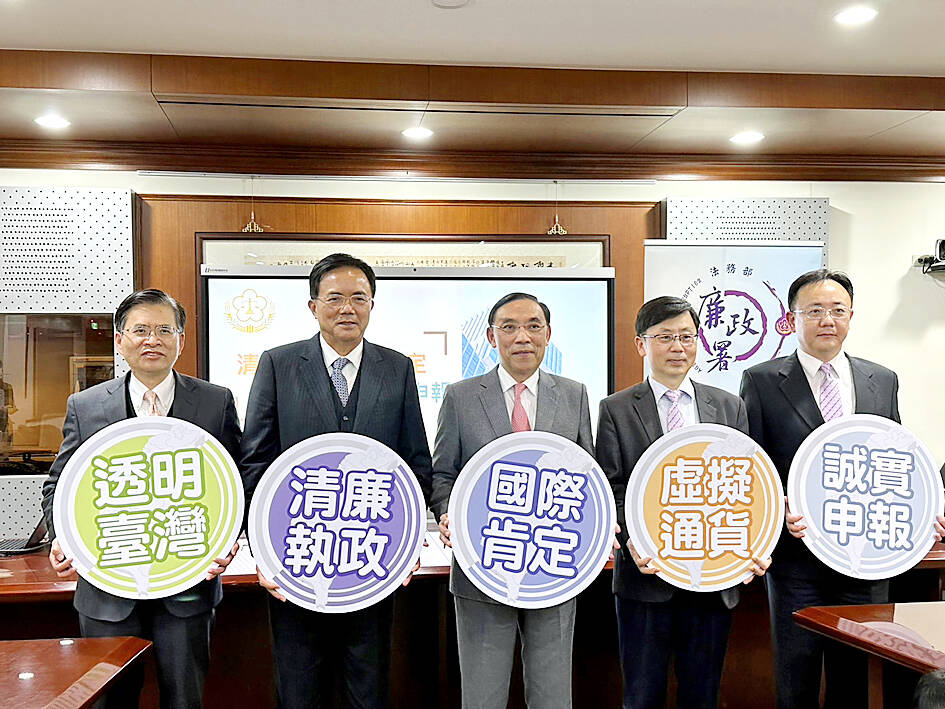Taiwan has maintained its No. 25 ranking in the global Corruption Perceptions Index, showing that its efforts to ensure transparency in governance are being recognized by the international community, Minister of Justice Tsai Ching-hsiang (蔡清祥) said yesterday.
Taiwan scored 68 on the index, outperforming 86 percent of the 180 countries on the list, Tsai told a news conference.
Published annually by Berlin-based Transparency International, the latest index was released on Jan. 31, ranking countries and territories worldwide by their perceived levels of public-sector corruption, scoring them on a scale of 0 (highly corrupt) to 100 (very clean).

Photo: CNA
Denmark ranked first with a score of 90, followed by Finland and New Zealand with 87 each, and Norway with 84.
Countries in the Indo-Pacific region that ranked higher than Taiwan were Singapore at No. 5, Hong Kong at No. 12, Australia at No. 13 and Japan at No. 18.
Regional countries that ranked lower than Taiwan were South Korea at No. 31, Malaysia at No. 61, China at No. 65, Vietnam at No. 77 and the Philippines at No. 116.
“Our efforts to root out corruption, bribery and graft have produced these results for the world to see,” Tsai said.
He called on the Ministry of Justice and law-enforcement agencies to keep up the good work, and encouraged them to help Taiwan catch up with Japan and Hong Kong on transparency and ethics in the public sector.
Tsai said “Taiwan’s ranking in the index has been rising over the past few years,” as it ranked between 29th and 31st places from 2016 to 2018, before improving to 28th place in 2019 and 2020.
The nation then moved up three spots to No. 25 in 2021 and last year.
Tsai attributed the improvement to government crackdowns on corruption, as well as probes by the Ministry of Justice Investigation Bureau and the Agency Against Corruption (AAC), alongside support from other law-enforcement agencies.
The government is committed to complying with the UN Convention Against Corruption, and working with international bodies against money laundering and terrorism financing, he said.
AAC Director-General Zhuang Rong-song (莊榮松) credited the Government Procurement Integrity Platform for the nation’s progress in the rankings.
The platform aims to root out bid-rigging, influence peddling, bribery and kickbacks, as well as the involvement of organized crime in public tenders for major government projects.
Its success in cleaning up corruption in public procurement projects has prompted corporations to work with the AAC and the justice ministry to set up a pilot Integrity Platform for Enterprises Services program to clean up the private sector, Zhuang said.
He said the government has been enforcing the Act on Property Declaration by Public Servants (公職人員財產申報法) that requires civil servants and elected officials — including lawmakers, city mayors and county commissioners, and city and county councilors — to declare their assets, which now includes cryptocurrency and other virtual assets, he said.
That is in addition to tangible holdings including cash, deposits, securities, jewelry, antiques, vehicles, real estate and other forms of investments, he added.
The requirement aims to ensure ethical practices, deter corruption and prevent the acquisition of funds and properties through illegal means, Zhuang said.

Chinese Nationalist Party (KMT) Chairman Eric Chu (朱立倫), spokeswoman Yang Chih-yu (楊智伃) and Legislator Hsieh Lung-chieh (謝龍介) would be summoned by police for questioning for leading an illegal assembly on Thursday evening last week, Minister of the Interior Liu Shyh-fang (劉世芳) said today. The three KMT officials led an assembly outside the Taipei City Prosecutors’ Office, a restricted area where public assembly is not allowed, protesting the questioning of several KMT staff and searches of KMT headquarters and offices in a recall petition forgery case. Chu, Yang and Hsieh are all suspected of contravening the Assembly and Parade Act (集會遊行法) by holding

PRAISE: Japanese visitor Takashi Kubota said the Taiwanese temple architecture images showcased in the AI Art Gallery were the most impressive displays he saw Taiwan does not have an official pavilion at the World Expo in Osaka, Japan, because of its diplomatic predicament, but the government-backed Tech World pavilion is drawing interest with its unique recreations of works by Taiwanese artists. The pavilion features an artificial intelligence (AI)-based art gallery showcasing works of famous Taiwanese artists from the Japanese colonial period using innovative technologies. Among its main simulated displays are Eastern gouache paintings by Chen Chin (陳進), Lin Yu-shan (林玉山) and Kuo Hsueh-hu (郭雪湖), who were the three young Taiwanese painters selected for the East Asian Painting exhibition in 1927. Gouache is a water-based

Taiwan would welcome the return of Honduras as a diplomatic ally if its next president decides to make such a move, Minister of Foreign Affairs Lin Chia-lung (林佳龍) said yesterday. “Of course, we would welcome Honduras if they want to restore diplomatic ties with Taiwan after their elections,” Lin said at a meeting of the legislature’s Foreign Affairs and National Defense Committee, when asked to comment on statements made by two of the three Honduran presidential candidates during the presidential campaign in the Central American country. Taiwan is paying close attention to the region as a whole in the wake of a

OFF-TARGET: More than 30,000 participants were expected to take part in the Games next month, but only 6,550 foreign and 19,400 Taiwanese athletes have registered Taipei city councilors yesterday blasted the organizers of next month’s World Masters Games over sudden timetable and venue changes, which they said have caused thousands of participants to back out of the international sporting event, among other organizational issues. They also cited visa delays and political interference by China as reasons many foreign athletes are requesting refunds for the event, to be held from May 17 to 30. Jointly organized by the Taipei and New Taipei City governments, the games have been rocked by numerous controversies since preparations began in 2020. Taipei City Councilor Lin Yen-feng (林延鳳) said yesterday that new measures by